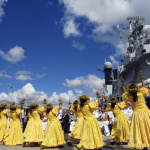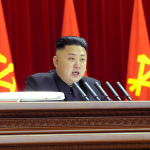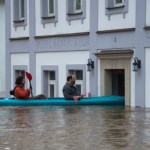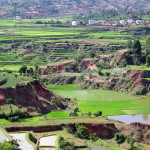- DETERRENCE: Could a Maritime Conflict Start a Sino-American War?
- DPRK: North Korea’s Ten Principles Show Regime Rigidity
- ENERGY SECURITY: The Dangerous Effects of Global Warming
- GOVERNANCE AND CIVIL SOCIETY: Asian Olympic Double to Unlock Continent’s Potential
- CLIMATE CHANGE ADAPTATION: Building Shared Understanding and Capacity for Action: Insights on Climate Risk Communication from India, Ghana, Malawi, and Mongolia,
- CLIMATE CHANGE AND SECURITY: Climate Change Will Bring More Surprises to Security Community
 DETERRENCE: Could a Maritime Conflict Start a Sino-American War? M. Valencia, The Japan Times, September 2, 2013
DETERRENCE: Could a Maritime Conflict Start a Sino-American War? M. Valencia, The Japan Times, September 2, 2013
The US and China should adopt voluntary guidelines to only use the ocean for peaceful purposes, and to refrain from the threat or use of force, as well as provocative acts such as collecting information to support the use of force against the coastal state, or interfering with naval electronic systems.
- Escalation Cause, How the Pentagon’s New Strategy Could Trigger War with China, D. Gompert, T. Kelly, Foreign Policy, August 2, 2013
- Sorry, AirSea Battle Is No Strategy, AirSea Battle Fails to Deter, Assure, or Guide, T. X. Hammes, August 7, 2013
- Chinese Navy Ships Arrive At Pearl Harbor For Rare Visit, A. McAvoy, Associated Press, September 6, 2013
 DPRK: North Korea’s Ten Principles Show Regime Rigidity. Christopher Green, Korea Realtime Report of the Wall Street Journal, (9 September 2013)
DPRK: North Korea’s Ten Principles Show Regime Rigidity. Christopher Green, Korea Realtime Report of the Wall Street Journal, (9 September 2013)
It is unclear what conditions have to be right from the North Korean standpoint to release Kenneth Bae. Paradoxically, the regime uses Rodman, Olympics, sports and reopening the Kaesong Industrial Zone as heterodoxy to internally demonstrate the orthodoxy of dynastic Kim family rule as enshrined in the 1974 “10 principles”.
- Koreas Negotiate to Re-Open Kaesong Industrial Park, The Hindu, (10 September 2013)
- Rodman to Try ‘Basketball Diplomacy’ with North Korea. Jonathan Allen, Reuters News Agency (9 September 2013)
- DN. Korea Revises ‘Ten Principles’ to Validate Leadership of Kim Jong un. Akihiko Kaise, The Asahi Shimbun (14 August 2013)
 ENERGY SECURITY: The Dangerous Effects of Global Warming, Editorial Board, Washington Post (9 September 2013)
ENERGY SECURITY: The Dangerous Effects of Global Warming, Editorial Board, Washington Post (9 September 2013)
The Washington Post continues to recite the mantra “humans shouldn’t just adapt but head off excessive future excessive warming by reducing greenhouse gas emissions now”. The news from the G-20 meeting in St Petersburg is that the US and China reiterated their agreement of a few months ago in California to merely reduce HFC use, to which the rest of the G-20 agreed. “Down Under” a new leader may revoke carbon taxation. EU energy companies are complaining about aggressive CO2 limits and subsidies for renewables creating stranded assets in the face of lower electricity demands.
- An attempt to escape perpetual failure on climate change at the G20, Stephen Stromberg, Washington Post blog Post-Partisan (9 September 2013)
- The triumph of Tony Abbott, Tom Switzer, Wall Street Journal (8 September 2013)
- European utilities warn EU over energy risks, Guy Chazan and Pilita Clark, Financial Times (9 September 2013)
 GOVERNANCE AND CIVIL SOCIETY: Asian Olympic Double to Unlock Continent’s Potential, Karolos Grohmann, Reuters (9 September 2013)
GOVERNANCE AND CIVIL SOCIETY: Asian Olympic Double to Unlock Continent’s Potential, Karolos Grohmann, Reuters (9 September 2013)
Tokyo’s pick as host of the 2020 Olympic Games following the 2018 Games in South Korea brings the region further into the global spotlight, along with regional issues. For example, Chinese media reacted by calling on Japan to reflect on its history. South Korea and China also released a joint statement last week expressing concern over Japan’s historical claims. Prime Minister Abe met with China’s Xi and South Korea’s Park for the first time in an unsubstantial meeting on the sidelines of the G-20.
- China Media: Tokyo’s Olympic Bid, BBC (9 September 2013)
- S. Korean and Chinese Legislative Bodies Release Joint Statement on Japanese Historical Distortions, Kim Su-heon, Hankyoreh (6 September 2013)
- Abe greets Chinese, S. Korean Leaders for First Time at G-20 Summit, Asahi Shimbun (6 September 2013)
 CLIMATE CHANGE ADAPTATION: Building Shared Understanding and Capacity for Action: Insights on Climate Risk Communication from India, Ghana, Malawi, and Mongolia, Jon Padgham et al., International Journal of Communication, vol. 7, pp. 970-983 (2013)
CLIMATE CHANGE ADAPTATION: Building Shared Understanding and Capacity for Action: Insights on Climate Risk Communication from India, Ghana, Malawi, and Mongolia, Jon Padgham et al., International Journal of Communication, vol. 7, pp. 970-983 (2013)
Developing credible and relevant approaches for communicating climate risks that are grounded in decision-making processes is essential for better managing risks associated with current climate variability and for developing pathways for adaptation to longer-term climate change. However, creating effective communication that informs climate risk management and adaptation remains a significant global challenge.
- Rapid Warming in Mid-Latitude Central Asia for the Past 100 Years, Fahu Chen et al., Frontiers of Earth Science in China, vo. 3, no. 1, pp. 42-50 (2009).
- Adaptive Capacity and Human Cognition: The process of Individual Adaptation to Climate Change, Torsten Grothmann and Anthony Patt, Global Environmental Change, vol. 15, no. 3, pp. 199-213 (2005)
 CLIMATE CHANGE AND SECURITY: Climate Change Will Bring More Surprises to Security Community, Interview with Mark Levy, State of the Planet, Earth Institute (5 September 2013
CLIMATE CHANGE AND SECURITY: Climate Change Will Bring More Surprises to Security Community, Interview with Mark Levy, State of the Planet, Earth Institute (5 September 2013
The collapse of the government in Madagascar a few years ago from opposition to the sweetheart deal that the government made in a long term land lease to the South Korea government was not on anybody’s radar. But it’s a direct response to a climate-triggered policy response. Korea is worried about how it’s going to feed its people in a climate-stressed, water-scarce world. They sought out these long-term land deals and it led to the collapse of a government.
- India’s Assam Shows Second-Order, Dangerous Effects of Climate Change in South Asia, Ashley Ziegler, New Security Beat (13 August 2013)
- Climate Change, Water Conflicts and Human Security: Regional Assessment and Policy Guidelines for the Mediterranean, Middle East and Sahel, Julia Kloos, Niklas Gebert, Therese Rosenfeld, Fabrice Renaud (coordinating authors), Institute for Environment and Human Security, United Nations University, Report No. 10 (August 2013)
- The breadbasket of South Korea: Madagascar, Vivienne Walt, Time (23 November 2008)
The Nautilus Peace and Security Weekly Report presents articles and full length reports each week in six categories: Austral security, nuclear deterrence, energy security, climate change and security, the DPRK, climate change adaptation and governance and civil society. Our team of contributors carefully select items that highlight the links between these themes and the three regions in which our offices are found—North America, Northeast Asia, and the Austral-Asia region.
Subscribe to NAPSNet to receive free weekly email reports
Editor
- Saegan Swanson (while Arabella Imhoff is on leave)
Contributors
- Deterrence: Peter Hayes
- Governance and Civil Society: Dyana Mardon
- Climate Change Adaptation: Saleem Janjua
- DPRK: Roger Cavazos
- Energy Security: Nikhil Desai
- Austral Peace and Security: Richard Tanter

